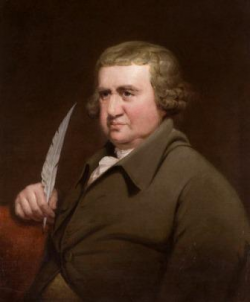Erasmus Darwin

- Born
- 12 December 1731
- Died
- 18 April 1802 (age 70)
Erasmus Darwin will be remembered most commonly for his exceptionally famous grandson, Charles. However, Erasmus Darwin is a great example of an Enlightenment thinker.
Not content solely with his duties as a local doctor, Darwin was also a poet, a natural philosopher, a slave trade abolitionist, an advocate of education for women and an inventor.
…as successive generations bloom,
New powers acquire and larger limbs assume;
Whence countless groups of vegetation spring,
And breathing realms of fin and feet and wing.Erasmus Darwin, The Temple of Nature, 1802.
Through his scientific work, and particularly as a result of his botanical interests, Darwin came to sense the interconnected nature of life on earth and started to gather some increasingly firm opinions about the evolution of different species across the planet. He did not express these views through peer reviewed articles like a modern day scientist, but instead through the medium of poetry. His fans included William Wordsworth. In his last long poem The Temple of Nature (which was originally entitled The Origin of Society) he argued that each generation of all the different kinds of animals would improve ever so slightly upon the last.
Erasmus Darwin was also involved in the establishment of one of the most important intellectual societies which existed outside of London; The Lunar Society of Birmingham. The group was not solely dedicated to cosmology as the name might suggest; but the gatherings occurred on evenings which sported a full moon to ensure enough light to guide all participants home.
The Society brought natural philosophers and industrialists together as it emphasised the practical utility of scientific knowledge in the everyday world. As one of the founding members of the Society, and always keen to make his friends join, Darwin brought together a range of important individuals. For example, he managed to place the industrial potter Josiah Wedgwood and the experimental chemist Joseph Priestley in the same room. The Lunar Society became something like an Enlightenment ‘think tank’ for the Industrial Revolution.
Like many people of his age, Darwin had little respect for the divides within intellectual culture; whether between the arts and the sciences, or between pure and applied science. Largely speaking, his concerns were not of a disciplinary nature, but were the issues which he felt faced mankind as a whole.
This profile was written by a Biology: Changing the World volunteer.



